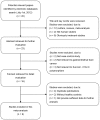Survivin -31G>C polymorphism and gastrointestinal tract cancer risk: a meta-analysis
- PMID: 23405077
- PMCID: PMC3566135
- DOI: 10.1371/journal.pone.0054081
Survivin -31G>C polymorphism and gastrointestinal tract cancer risk: a meta-analysis
Abstract
Background: Emerging evidence showed that common functional -31G>C polymorphism (rs9904341 G>C) in the promoter region of the survivin gene is involved in the regulation of survivin expression, thus increasing an individual's susceptibility to gastrointestinal tract (GIT) cancer; but individually published results are inconclusive. The aim of this systematic review and meta-analysis was to derive a more precise estimation of the association between survivin -31G>C polymorphism and GIT cancer risk.
Methods: A literature search of PubMed, Embase, Web of Science and CBM databases was conducted from inception through July 1st, 2012. Crude odds ratios (ORs) with 95% confidence intervals (CIs) were used to assess the strength of association.
Results: Nine case-control studies were included with a total of 2,231 GIT cancer cases and 2,287 healthy controls. The results indicated that survivin -31G>C polymorphism was associated with increased risk of GIT cancer. In the stratified analysis by cancer types, significant associations were observed between survivin -31G>C polymorphism and increased risk of colorectal and gastric cancers. However, the lack of association of survivin -31G>C polymorphism with esophageal cancer risk may be due to a lack of a sufficient number of eligible studies and the influence of different genetic and environmental factors.
Conclusion: Results from the current meta-analysis suggests that survivin -31G>C polymorphism might increase the risk of GIT cancer, especially among gastric and colorectal cancers.
Conflict of interest statement
Figures






References
-
- Lambert R, Hainaut P (2007) The multidisciplinary management of gastrointestinal cancer. Epidemiology of oesophagogastric cancer. Best Pract Res Clin Gastroenterol 21: 921–945. - PubMed
-
- Jemal A, Bray F (2011) Center MM, Ferlay J, Ward E, et al (2011) Global cancer statistics. CA Cancer J Clin 61: 69–90. - PubMed
-
- Ferlay J, Shin HR, Bray F, Forman D, Mathers C, et al. (2010) Estimates of worldwide burden of cancer in 2008: GLOBOCAN 2008. Int J Cancer 127: 2893–2917. - PubMed
-
- Pharoah PD, Dunning AM, Ponder BA, Easton DF (2004) Association studies for finding cancer-susceptibility genetic variants. Nat Rev Cancer 4: 850–860. - PubMed
-
- McCormack VA, Boffetta P (2011) Today’s lifestyles, tomorrow’s cancers: trends in lifestyle risk factors for cancer in low- and middle-income countries. Ann Oncol 22: 2349–2357. - PubMed
Publication types
MeSH terms
Substances
LinkOut - more resources
Full Text Sources
Other Literature Sources

